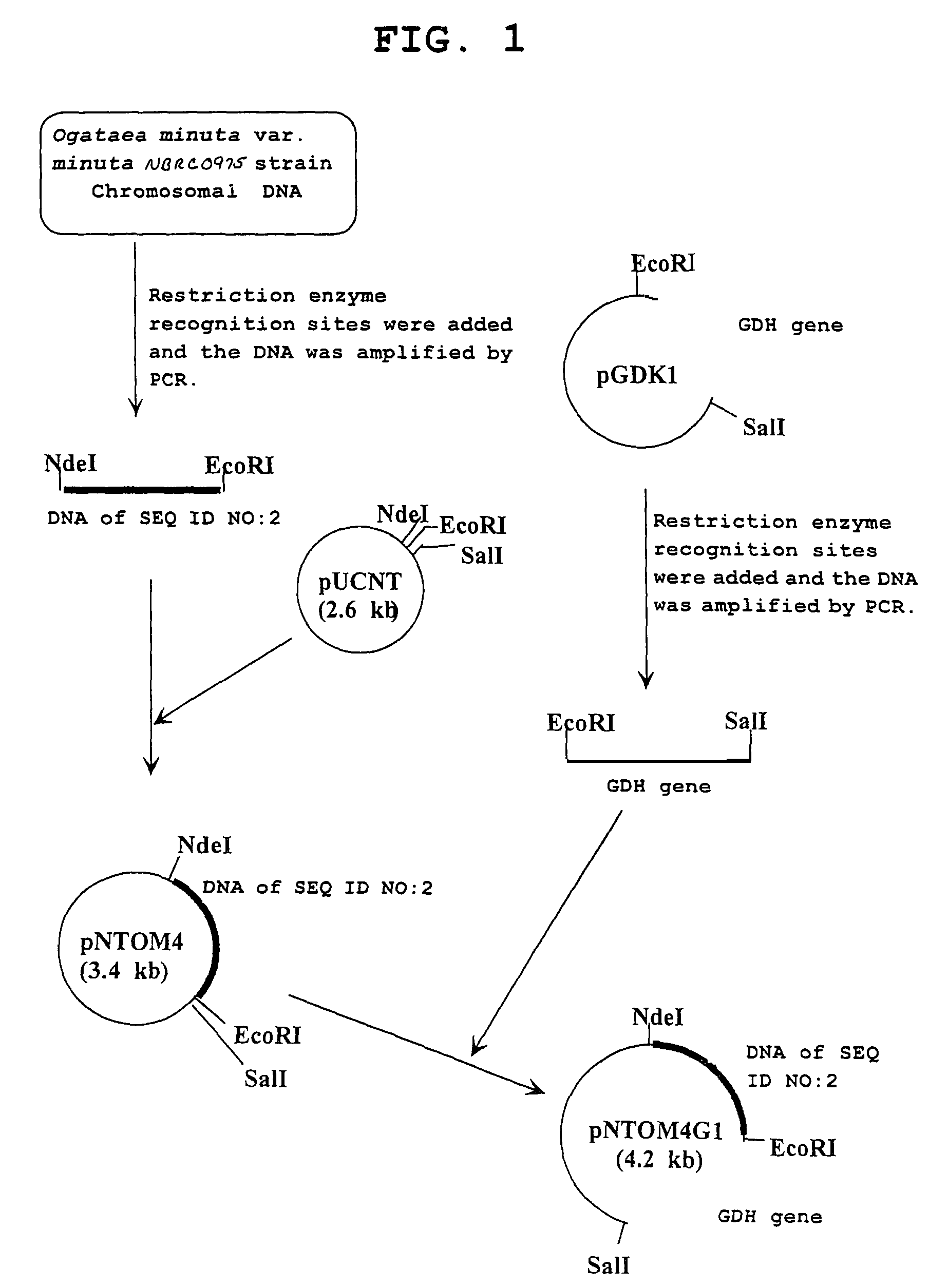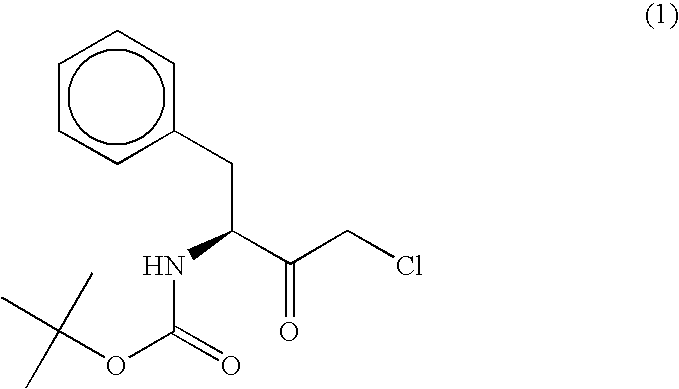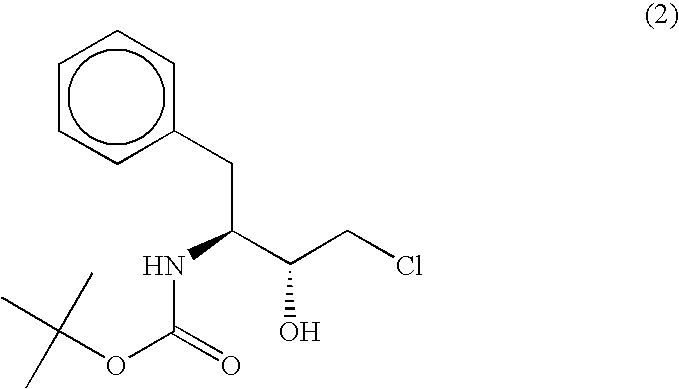Carbonyl reductase, gene thereof and method of using the same
a technology of carbonyl reductase and reductase, which is applied in the field of polypeptide (carbonylreductase), can solve the problems of insufficient stereoselectivity of the reaction mixture, requiring a comparatively expensive reducing agent, and insufficient concentration of the product that can be accumulated in the reaction mixtur
- Summary
- Abstract
- Description
- Claims
- Application Information
AI Technical Summary
Benefits of technology
Problems solved by technology
Method used
Image
Examples
example 1
Purification of Polypeptide
[0062]According to the following method, a polypeptide having an activity to asymmetrically reduce (3S)-1-chloro-3-tert-butoxycarbonylamino-4-phenyl-2-butanone to produce (2R,3S)-1-chloro-3-tert-butoxycarbonylamino-4-phenyl-2-butanol was isolated and purified from the Ogataea minuta var. minuta NBRC0975 strain. Unless otherwise specified, the purification was performed at 4° C.
[0063]The reduction activity on (3S)-1-chloro-3-tert-butoxycarbonylamino-4-phenyl-2-butanone was determined by dissolving, in 100 mM phosphate buffer (pH 6.5) containing 0.33% (v / v) dimethyl sulfoxide, a substrate [(3S)-1-chloro-3-tert-butoxycarbonylamino-4-phenyl-2-butanone] to a final concentration of 0.2 mM and a coenzyme NADPH to a final concentration of 0.25 mM, further adding a crude enzyme solution, carrying out the reaction at 30° C. for 1 min and calculating from the rate of decrease in the absorbance of the reaction mixture at a wavelength of 340 nm. The activity to oxidize...
example 2
(Preparation of PCR Primers)
[0073]The purified polypeptide obtained in Example 1 was denatured in the presence of 8M urea and digested with lysyl endopeptidase derived from Achromobacter (manufactured by Wako Pure Chemical Industries, Ltd.). Then, the amino acid sequence of the obtained peptide fragment was determined by ABI492 protein sequencer (manufactured by Perkin Elmer). Based on the DNA sequence predicted from the amino acid sequence, primer 1: 5′-acngtntayttyathgcngg-3′ (SEQ ID NO: 5) and primer 2: 5′-atnggdatrtcraaytgrtc-3′ (SEQ ID NO: 6) for amplifying a part of the gene encoding the polypeptide by PCR were synthesized.
(Gene Amplification by PCR)
[0074]Chromosomal DNA was extracted from the cells of Ogataea minuta var. minuta NBRC0975 strain cultured in the same manner as in Example 1 according to the method of Visser (Appl. Microbiol. Biotechnol., 53, 415 (2000)) and the like. Using the DNA primers 1 and 2 prepared above and the obtained chromosomal DNA as a te...
example 3
Construction of Expression Vector
[0076]Using primer 3: 5′-gtgcatatgaccaagactgtttatttca-3′ (SEQ ID NO: 9) and primer 4: 5′-gtcgaattcttattaaaatggaatgtcgaa-3′ (SEQ ID NO: 10) and the chromosomal DNA of the Ogataea minuta var. minuta NBRC0975 strain obtained in Example 2 as a template, PCR was performed. As a result, a double stranded DNA wherein an NdeI recognition site is added to the initiation codon and an EcoRI recognition site is added immediately after the termination codon of a gene having the base sequence shown in SEQ ID NO: 2 was obtained. PCR was performed using TaKaRa LA Taq (manufactured by TAKARA BIO) as a DNA polymerase, where the reaction conditions followed the instruction manual thereof. The DNA was digested with NdeI and EcoRI, and inserted between the NdeI recognition site and the EcoRI recognition site in the downstream of the lac promoter of plasmid pUCNT (WO94 / 03613) to construct a recombinant vector pNTOM4.
[0077]Similarly, using primer 5: 5′-gtgcatatggctaagactgt...
PUM
| Property | Measurement | Unit |
|---|---|---|
| wavelength | aaaaa | aaaaa |
| pH | aaaaa | aaaaa |
| flow rate | aaaaa | aaaaa |
Abstract
Description
Claims
Application Information
 Login to View More
Login to View More - R&D
- Intellectual Property
- Life Sciences
- Materials
- Tech Scout
- Unparalleled Data Quality
- Higher Quality Content
- 60% Fewer Hallucinations
Browse by: Latest US Patents, China's latest patents, Technical Efficacy Thesaurus, Application Domain, Technology Topic, Popular Technical Reports.
© 2025 PatSnap. All rights reserved.Legal|Privacy policy|Modern Slavery Act Transparency Statement|Sitemap|About US| Contact US: help@patsnap.com



